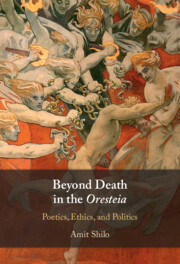The writing of this book started during a time of global financial crisis and continued through wars and deepening partisanship. The book was finalized during protests against both particular violence and systemic racism, taking place in the midst of a harrowing plague on a global scale, whose gruesome toll is still unknown. While writing about ethical action and political themes in Greek tragedy, I have kept foremost in my mind these modern conflicts and pervasive, historically rooted issues of social justice. The Oresteia has provided a way to think through a number of these themes in mythic and historical time, since it dramatizes the consequences of war, oppression, and interpersonal violence with prodigious complexity.
One cannot comprehensively interpret a tragic work, nor do I attempt to here; instead, I analyze how human continuation beyond death transforms a number of the Oresteia’s most widely discussed themes. One goal of this book is to draw new attention to individual ethical claims, especially of those who are oppressed. Another is to demonstrate that the Oresteia undercuts its own justifications of warfare through its polytheistic conflicts and plural ideas about the afterlife. I therefore hope that the analysis of the “poetics of the beyond” and the “poetics of multiplicity” herein can be more broadly understood as a contribution toward responsible ethical and political thought.
In the dozen years since beginning this project, I have racked up more intellectual and emotional debts than it is possible to acknowledge. The book, as it stands, has evolved significantly from its origins in my dissertation at the New York University Department of Classics. For his perspicacity and support, I deeply thank, first of all, my advisor Phillip Mitsis. He and David Konstan continued to help improve drafts well after my time as a graduate student ended. Special thanks as well go to Joy Connolly, Peter Meineck, and Raffaella Cribiore. They have each not only served as scholarly paradigms with their wide-ranging interests but have also given me sage advice over many years. The idea for the project came in part from my immersive experience as a graduate student on a fellowship at the American School of Classical Studies in Athens, which I recommend to all my students.
This book developed in many ways during my postdoctoral fellowship at Harvard’s Mahindra Humanities Center. The time to write was invaluable, as was the freedom to attend workshops, reading groups, and talks in numerous Harvard departments, which helped expand my theoretical and philosophical range. I am immensely grateful for the generosity of John Hamilton, Gordon Teskey, and Jamey Graham, whose friendship I cherish. The Harvard Department of the Classics in general, and Gregory Nagy and David Elmer in particular, provided a superb resource throughout.
I would especially like to thank each of my world-class UCSB colleagues, with a further debt of kharis for those who gave feedback on chapters, namely Francis Dunn, Dorota Dutsch, Brice Erickson, and Emilio Capettini. Other colleagues and friends to whom I am deeply obliged for support, intense intellectual exchanges, and sharing work are Dan-el Padilla Peralta, Helen Morales, Daniel Markovic, Rosa Andújar, Alexander Loney, and Joshua Billings. Simon Goldhill’s Sophocles course during a visiting semester at Princeton and his sophisticated writing on tragedy were an additional inspiration for this book. There are too many other teachers, colleagues, and students to thank by name, but I hope I am able to express gratitude in person or to pass their kindness along to others.
The UCSB Regents and the Interdisciplinary Humanities Center, run by Susan Derwin, have generously awarded fellowships that enabled me to complete this book. I am greatly indebted to Michael Sharp for help with every aspect of publication and to the anonymous reviewers at Cambridge for their precise and positive feedback. I thank the American Journal of Philology and its editor, David H. J. Larmour, for permission to use my 2018 article, “The Ghost of Clytemnestra in the Eumenides: Ethical Claims Beyond Human Limits” (AJP 139 (4): 533–76), a revised version of which is Chapter 6 of this book.
For their support throughout these times of turmoil, my gratitude to my family and friends defies expression. Three of my philoi deserve final recognition, having improved dozens of drafts over many years: my partner, Maren Lange, for joy, grace, immense patience, perspective, nimble conversation, and unstinting support; my aunt, Nancy Felson, for inspiring me to take up Classics, homophrosynē, and boundless intellectual generosity; and finally, my father, Steve Felson, whose motto, “let’s rethink this,” encapsulates a lifetime’s worth of incisive critique.

